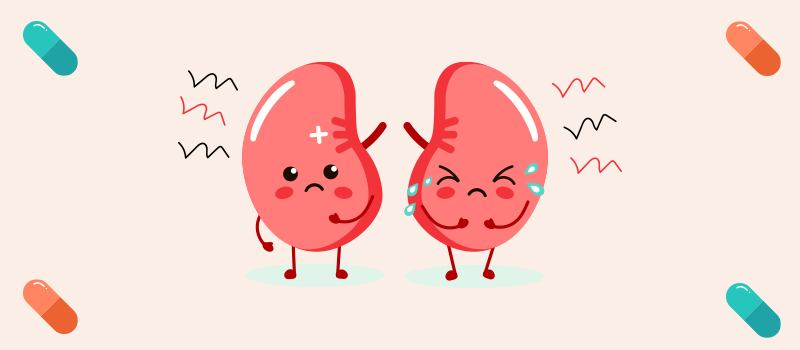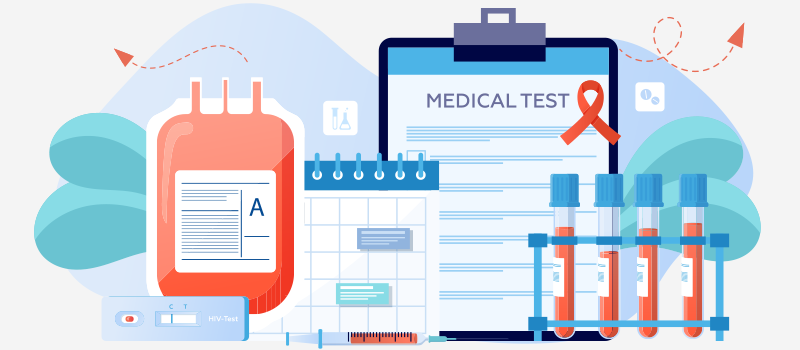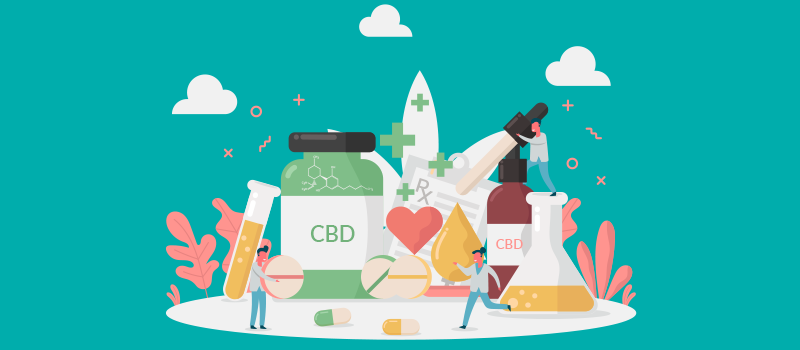What’s the Buzz
The Bee Healthy Blog
Medications That Can Cause Nephrotoxicity (Kidney Damage)

The kidney is a vital organ that performs several essential functions in the body, including detoxification (removing toxins from the blood) and maintaining homeostasis ( the body's ability to maintain a stable, constant environment internally). Nephrotoxicity is a term used to describe a rapid deterioration in kidney function due to the toxic effects of chemicals or drugs (approximately 20% of nephrotoxicity is caused by drugs).
Please continue reading to learn more about nephrotoxicity and some medication classes that can cause kidney damage.
What are acute kidney injury (acute renal failure) and chronic kidney disease?
Before we look at some of the medications that can cause kidney damage, let’s understand the different types of kidney dysfunction. Drug-induced nephrotoxicity can contribute to two types of kidney disease - acute kidney injury (AKI) and chronic kidney disease (CKD).
Acute Renal Failure
Acute kidney injury (also referred to as acute renal failure) develops rapidly. It can range from minor to severe renal dysfunction requiring renal replacement therapy (dialysis). Doctors manage acute kidney injury by identifying and treating the underlying cause while minimizing associated complications. Acute kidney injury is usually reversible.
Chronic Kidney Disease
Chronic kidney disease (CKD) develops gradually for months or even years. It is usually the result of a chronic condition such as diabetes or high blood pressure. Most patients with CKD don’t have any symptoms in the early stages, and the condition is typically discovered incidentally on routine testing for unrelated problems. Medical treatment can slow the progress of renal dysfunction. However, keep in mind that CKD is irreversible and eventually leads to end-stage renal disease with the need for dialysis or a kidney transplant.
Types of Kidney Damage
Doctors also use specific terms to describe where the damage has occurred in the kidney. For example, acute tubular necrosis refers to damage to the renal tubular cells; tubules are tiny ducts responsible for the reabsorption of water and other nutrients back to the blood. Glomerulonephritis refers to an inflammation of the kidneys’ glomeruli - the cluster of nerve endings or small blood vessels filtering the blood. Interstitial nephritis refers to an inflammation of the spaces between the tubules - it can be short-term (acute interstitial nephritis) or long-term (chronic interstitial nephritis).
Rhabdomyolysis
A potentially life-threatening condition called rhabdomyolysis warrants mention here. Rhabdomyolysis is a serious condition caused by muscle injury or muscle death. . As the muscle cells are broken down, a substance called myoglobin is released into the blood. Large quantities of myoglobin can damage the kidneys; this can lead to acute renal failure because the kidneys are unable to remove the waste material from the blood efficiently. Therefore, drugs that can cause rhabdomyolysis can indirectly lead to acute renal failure.
Who is at risk of drug-induced renal failure?
Some people are at higher risk of drug-induced nephrotoxicity (kidney damage) than others. Patient-related risk factors include:
- Older age (over 60 years)
- Underlying renal insufficiency - reduced glomerular filtration rate (GFR) and/or elevated serum creatinine (SCr) and/or blood urea nitrogen (BUN).
- Medical conditions such as intravascular volume depletion (seen in vomiting, diarrhea, and bleeding), diabetes, cardiovascular diseases such as hypertension, liver dysfunction, electrolyte imbalances, and sepsis.
Drug-induced nephropathy (kidney dysfunction) also depends on drug-related risk factors. For example, some types of drug-induced kidney damage are dose-dependent. These predictable effects occur when a medication is given at high doses or for a longer duration. For instance, aminoglycoside antibiotics are known to cause nephrotoxicity at high doses. The other type of drug-associated renal dysfunction is unpredictable and unrelated to dose. For instance, proton pump inhibitors can cause interstitial nephritis, and there is no way to predict or prevent the damage.
In hospitalized patients, drug-induced kidney damage occurs due to concurrent use of more than one medication that can cause nephrotoxic acute renal failure and possible chronic renal failure without prompt discontinuation of the offending drugs. For example, patients treated with pain relievers (such as nonsteroidal anti-inflammatory medications [NSAIDs]) and certain antibiotics are at considerably higher risk of drug-induced acute kidney injury. Both of these drugs can cause kidney damage, thus, decreasing kidney function over time. The risk of renal toxicity and hospital-acquired renal insufficiency can be lowered by minimizing exposure to multiple nephrotoxic drugs, in addition to assessing other risk factors such as age and other medical conditions.
Which medication is most likely to cause nephrotoxicity?
Multiple medication classes can cause drug-induced kidney disease. Some of them are described below. This article aims to familiarize you with different nephrotoxic drug classes. Though different drug classes can cause specific types of kidney injury, do not get overwhelmed with the medical terminology. Talk to your doctor or pharmacist if you have more questions about the different types of kidney injury.
Pain Relievers
Pain medications such as acetaminophen (Tylenol) and aspirin can cause chronic interstitial nephritis. Nonsteroidal anti-inflammatory drugs (NSAIDs) such as ibuprofen (Motrin, Advil) and naproxen sodium (Aleve) are some of the most common culprits in causing drug-induced nephrotoxicity. NSAIDs can lead to acute interstitial nephritis, chronic interstitial nephritis, and glomerulonephritis. Long-term use of these medications can lead to chronic kidney disease.
Antidepressants and Mood Stabilizers
Certain antidepressants like fluoxetine (Prozac), amitriptyline (Elavil), and doxepin (Zonalon) can cause rhabdomyolysis, leading to acute kidney injury. The mood stabilizer lithium used to treat bipolar disorder can also cause rhabdomyolysis, then kidney injury--specifically chronic interstitial nephritis and glomerulonephritis.
Antihistamines
Medications such as diphenhydramine (Benadryl) and doxylamine (Unisom) can contribute to rhabdomyolysis and acute kidney injury.
Antimicrobials
Antimicrobials such as aminoglycosides, antifungals (amphotericin B), beta-lactams (cephalosporins, penicillins), quinolones (ciprofloxacin), rifampin (Rifadin), and vancomycin (Vancocin) can lead to drug-induced acute renal failure.
Antiviral medications such as acyclovir (Zovirax), Foscarnet (Foscavir), and ganciclovir (Cytovene) are also known to cause drug-induced nephrotoxicity.
Pentamidine (Pentam), a broad-spectrum antimicrobial used to treat parasitic infections, may cause acute tubular injury.
Statins
Rarely, cholesterol-lowering medications called statins (simvastatin (Zocor) and atorvastatin (Lipitor) can cause rhabdomyolysis, resulting in acute renal failure.
Proton Pump Inhibitors
Proton pump inhibitors (drugs that reduce stomach acid production), such as lansoprazole (Prevacid), pantoprazole (Protonix), and omeprazole (Prilosec), can cause acute interstitial nephritis.
Cardiovascular Medications
Medications used to treat cardiovascular diseases, such as angiotensin-converting enzyme inhibitors (ACE inhibitors), angiotensin receptor blockers (ARBs), and diuretics (water pills) such as triamterene (Dyrenium), can cause drug-induced nephrotoxicity. Platelet inhibitors, such as clopidogrel (Plavix) and ticlopidine (Ticlid), have been shown to rarely cause drug-induced thrombotic microangiopathy (small clots that lead to red blood cell damage).
Antiretrovirals
Antiretroviral drugs used to treat HIV/AIDS, hepatitis, cytomegalovirus infection can cause tubular cell toxicity and acute interstitial nephritis. Examples include adefovir (Hepsera), tenofovir (Viread), cidofovir (Vistide), and indinavir (Crixivan).
Immunosuppressants
Calcineurin inhibitors that prevent organ rejection after transplant can cause drug-induced nephropathy. Examples include tacrolimus (Prograf) and cyclosporine (Neoral).
Chemotherapy Medications
Chemotherapeutic agents such as carmustine (Gliadel), cisplatin (Platinol), interferon-alfa (Intron A), methotrexate, and mitomycin-C (Mutamycin) can cause drug-induced kidney disease.
Contrast-Induced Nephropathy
Exposure to intravenous contrast agents (dyes) used during medical imaging such as CT, MRI, and X-ray can lead to tubular cell toxicity and acute tubular necrosis. This type of renal injury is called contrast-induced nephropathy.
Drugs of Abuse
Heroin, cocaine, methamphetamine, methadone, and ketamine (Ketalar) can cause drug-induced rhabdomyolysis and acute renal failure.
Herbal Products
Certain Chinese herbs such as aristolochic acid have been linked to drug-induced nephrotoxicity, specifically chronic interstitial nephritis.
The above list is by no means a comprehensive list of medications that can cause drug-induced nephrotoxicity. If you are at high risk of drug-induced nephrotoxicity due to age, underlying renal dysfunction, or comorbidities such as diabetes, you should talk to your doctor about assessing your baseline renal function before starting any new medication that can potentially cause kidney damage. Also, ask questions about nephrotoxic drug combinations (taking more than one medication that can cause renal injury) to find out if your current medications put you at higher risk for kidney injury.
Keep all your doctor and blood test appointments. Your doctor will want to monitor renal function while taking drugs associated with nephrotoxicity.
Drug-induced nephrotoxicity is usually reversible with early detection. Doctors can treat drug-induced nephrotoxicity by discontinuing the culprit medication, replacing fluids, and treating kidney inflammation.
References:











SOCIAL